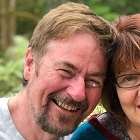Turning Back Poem by John Beaton
Turning Back
The road's a cul-de-sac that curves to swoop
along the sickle spit to the estuary;
today that arc encompasses a group
of stone-still shapes, a heron statuary.
An aged couple views this sanctuary;
he points across the wetland—her eyes follow.
She marks the birds and smiles. Her cheeks are hollow.
A crack! A gull has dropped a butter-clam
upon the road. It bounces—clackity clack—
beside them, then the gull descends to cram
it back into its beak and flaps to pack
it skywards once again, then drop it: smack!
No higher than before, the gull repeats
these drops, not having learned from its defeats.
Approaching the pavement's end, they hesitate,
uncertain whether to venture to the beach—
are they too frail? As they deliberate
their shrinking bounds, the gull emits a screech
of failure, then the sea seems out of reach.
They turn towards the graven herons once more,
crestfallen that they haven't walked the shore.
The sky is blue. The snowy mountains shine
by white-capped straits. The bay is halcyon.
Along the beach, straw-colored eggs define
the tide-line, surfeit of the herring-spawn.
And, carpeting the sea, the birds go on
and on. A flock of sunlit gulls unrolls
across the sky like fleeing herring shoals.
The fishing boats are congregating here,
readying their seine-nets and their skiffs,
practicing maneuvers with their gear;
the glaucous gulls are raucous in their tiffs
and far-off cliff-lines echo back the riffs
of seal-packs slapping suicidal tails,
a drumbeat, summoning the killer-whales.
A squeal! It differs from the sound of seals—
the couple stops, aware of something odd,
as, overhead, an eagle glides and wheels,
then plummets from the heavens like a god...
There's broken shell upon the roadside sod—
before it died, the gull had breached its bounds
and dined. They turn towards the spawning-grounds.
This poem was first published in the 2012 Summer edition of the literary magazine, Able Muse, and it has been subsequently published in "Eyes on BC" magazine. The thought behind it is that death comes anyway and, even with some risk, it's better to live life to the full than be over-cautious.
The stanza form is "rhyme royal", which goes back to some of Chaucer's Canterbury Tales. Each stanza has seven five-beat lines with an ababbcc rhyme-scheme. The beats are mainly embedded in two-syllable units ("iambic meter") , with some variations to avoid the "plodding" effect that can happen when this meter is too uniform. The beats in the first line are:
The ROAD'S a CUL-de-SAC that CURVES to SWOOP
This poem has not been translated into any other language yet.
I would like to translate this poem